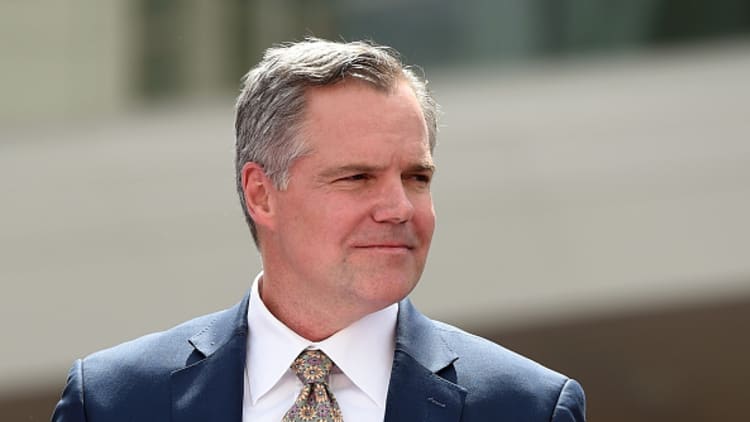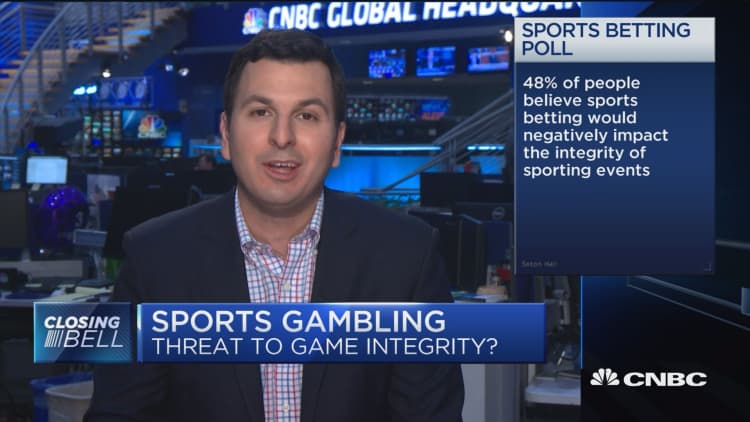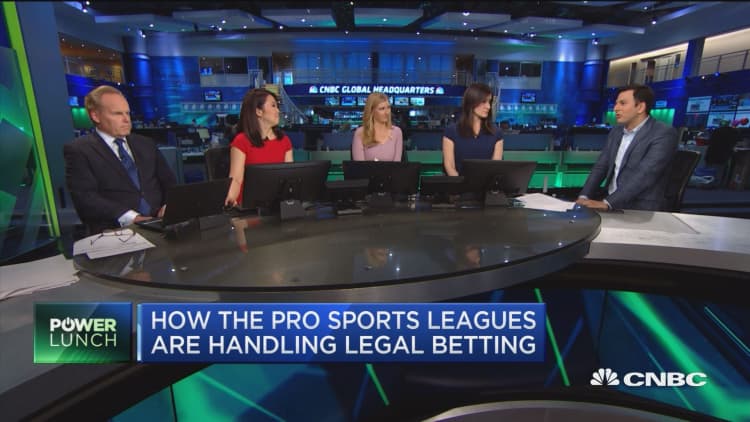Casinos around the country may soon feel a bit more like those in Las Vegas.
That's what casinos and racetracks nationwide are betting on after last week's monumental U.S. Supreme Court decision to allow states to legalize sports gambling, overturning federal legislation that banned the practice outside of Nevada. Gambling establishments hope to be soliciting wagers on sporting events and horse races as soon as possible.
Although last Monday's Supreme Court ruling on the Murphy v. National Collegiate Athletic Association case is only to give states the right to legalize sports gambling--and not to automatically legalize it nationwide--the move is likely to prompt significant short-and-long term changes for sports fans, leagues, teams and the media.
Betting on sports already occurs regularly throughout the country, but to this point it has largely been through unregulated and illegal channels. The American Gaming Association estimates that Americans illegally wager about $150 billion on U.S. sports and $500 billion globally every year.
Now, casinos, states and—more recently—sports leagues themselves are seeing sports betting legalization as a way to pull from that previously untapped pool of underground gambling money.
States like New Jersey could see legal sports betting begin as soon as this weekend. The Garden State is among the best-prepared states to act quickly on the historic court decision because it's the state where the now-successful legal battle began.
Sports leagues were often the biggest roadblock to the now-open sports betting atmosphere, butting heads with gaming advocates and those seeking bigger profits because the leagues have long seen gambling as a threat to sports' integrity.
The leagues' nervousness around the growing appeal of sports gambling prompted a federal law known as the Professional and Amateur Sports Protection Act of 1992 (PASPA), which made it unlawful for states to "sponsor, operate, advertise, promote, license or authorize" sports gambling practices. Nevada—which has allowed widespread sports gambling since 1949—was grandfathered from the law and the only state fully excluded from PASPA's ban.
After former New Jersey Gov. Chris Christie signed a law declaring sports gambling legal in the state in 2012, the NCAA and North America's four major professional sports leagues sued Christie, citing PAPSA's restrictions. The ensuing legal battle eventually ascended to the nation's highest court.
Now that the Supreme Court struck down PAPSA for unconstitutionally restricting states' rights granted by the 10th Amendment, a domino effect is about to play out before the nation's eyes.
In preparation for a ruling such as this, five states have already passed legislation that puts them in a position to legalize and organize sports gambling. Fourteen more states have introduced such bills in hopes of passing them.
"There's never been momentum like this before," says Sara Slane, Senior Vice President of Public Affairs at the AGA, in regard to the support that legalized sports gambling has gained in recent years. "We're extremely optimistic about the future [of sports gambling]."
Along with state legislatures, companies and resorts have also been preparing for this moment and are primed to capitalize on PASPA's demise.
"We have already established the architecture to deploy sports betting as soon as the states allow us to do that," MGM Resorts CEO Jim Murren said last week on CNBC's "Power Lunch."

Murren said that the ruling could lead to "hundreds of millions of dollars in profit to the company." Murren's optimism stems from, among other factors, MGM's footprint beyond Las Vegas; the company owns the Borgata resort in Atlantic City, New Jersey and other gambling properties in Illinois, Maryland, Massachusetts, Michigan and Mississippi.
As sports gambling legalization spreads, the gaming and sports industries could see massive financial benefits. The AGA argues that a transparent, regulated and legal sports betting market will subvert the illegal market, and a cut of those billions will then go to newly-minted sportsbooks.
"The gaming industry certainly stands to benefit," Slane says. "But the biggest beneficiary in all of this is sports."
Fans figure to spend more time watching sports in a legalized sports betting environment, as they're more likely to have money on the line at any moment and to want to see if their bets pay off. This increased fan engagement could lead to a jump in advertising sales and sponsorship deals, which Slane says would be highly profitable for sports leagues and "transformational" for the sports broadcasting industry and linear TV.
Sports franchise values could also soar as fans become more involved and invested in sports. In the immediate aftermath of last Monday's ruling, Dallas Mavericks owner Mark Cuban said on CNBC's "Squawk Alley" that "everybody that owns a Top Four professional sports team just basically saw the value of their team double, at least."
The positive momentum for legalized sports gambling comes after traditionally staunch opposition from American professional sports leagues and the NCAA.
Only six years ago, former National Basketball Association Commissioner David Stern and former Major League Baseball commissioner Bud Selig vehemently opposed the measures New Jersey took to fight the federal sports gambling ban. Stern said New Jersey had "no idea what it [was] doing," while Selig said he was "appalled" at New Jersey's legal moves.

Both leagues have been affected by threats to their games' integrity from sports gambling. The NBA banned former referee Tim Donaghy after he was caught betting on league games. Major League Baseball levied a lifetime ban on all-time hits leader Pete Rose after he was found betting on games he managed and played in. Baseball's first major betting scandal was the infamous Black Sox scandal, in which Chicago White Sox players fixed the 1919 World Series after betting against themselves.
In recent years, however, professional sports have not only warmed to gambling associations but have also talked openly about becoming involved in regulated sports betting. Current NBA Commissioner Adam Silver seemed to open the door for the current sports betting climate when he penned a 2014 op-ed in The New York Times advocating for a legalized and regulated sports betting environment.
"There is an obvious appetite among sports fans for a safe and legal way to wager on professional sporting events," Silver wrote. "I believe that sports betting should be brought out of the underground and into the sunlight where it can be appropriately monitored and regulated."
Traditionally separated from Las Vegas because of the city's gambling notoriety, sports teams are now taking advantage of the city's grand stage and fruitful economic market.
Last fall, the National Hockey League's Vegas Golden Knights became the first professional sports team to play in Las Vegas. The Golden Knights' newly-constructed home arena, T-Mobile Arena, was partially financed by MGM Resorts. MGM also bought the WNBA's San Antonio franchise and moved it to Las Vegas, where the team is known as the Aces and plays at the Mandalay Bay Events Center.
The National Football League's Oakland Raiders also plan to move to Las Vegas in 2022; a new stadium is being built for the team near the famed Las Vegas Strip.

Still, the leagues don't appear to be fully satisfied with PAPSA's dismissal. All four major North American sports leagues issued a response to the Supreme Court's ruling, with all saying strong regulatory legislation is needed to create an atmosphere that protects the integrity of their sports.
Both the MLB and NBA have proposed several regulatory measures, including a one percent fee on all legal sports gambling transactions on their games to protect integrity and drive a profit from wagers.
NHL commissioner Gary Bettman admitted on CNBC's "Squawk Box" last week that legal sports betting could create "a fair amount of opportunity" for hockey if Congress passes a "one-size-fits-all sports betting solution."

The NCAA, meanwhile, said in a statement it would "adjust sports wagering and championship policies to align with the direction from the court."
Slane says traditionalists who believe sports gambling legalization will only make the sports industry more vulnerable to corruption are taking a "bury your head in the sand" approach.
"Right now, we don't have the ability to detect nefarious actors in the illegal sports betting market," she said. "By bringing it out into a transparent, legal setting, we can more easily address any of those corruption issues."
In spite of what will surely be companies' concerted efforts to profit off of the Supreme Court decision as quickly as possible, the sports gambling regulatory battle may rage on for the foreseeable future. Concerns that the ruling will promote game-fixing or gambling addiction will persist, and all of the industry's players will fight for a bigger piece of the pie.
It's clear, however, that sports leagues, teams, the gaming industry and the states themselves all see PASPA's downfall as a chance to cash in on billions of previously elusive dollars. Sooner or later, they all may be going all in.








